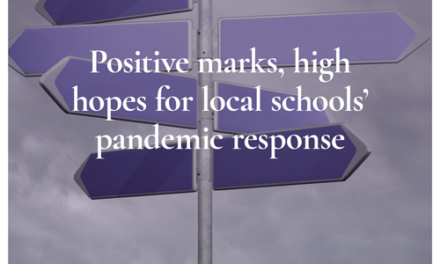The bumpy implementation of the Common Core and its assessments has a thorny knot of political alliances and adversaries.
Advocates of the Common Core State Standards say that high, uniform academic standards are essential to improving American students’ academic performance — to prepare them better for college or career and to enhance our nation’s ability to compete in the global marketplace.
However, surveys of teachers and the general public reveal growing opposition to the Common Core as it entered its first year of full implementation nationwide in 2014-15. These same surveys also show that most people do not know much about the Common Core and that much of what they think they know is incorrect. Opposition to the Core does not stem from a single source and is not confined to members of one political party. People dislike the Common Core for different reasons; it is important to disaggregate the sources of opposition and to assess and then to dispel some of the myths built up around it. It also is important to understand the unusual political alliances that have emerged in opposition to Common Core implementation and how they may play out longer term.
Federal (read: Presidential) overreach
Some, particularly Tea Party adherents and others on the right, view the Common Core as a dangerous — even unconstitutional — expansion of federal control into education and a violation of states’ rights. The word “education” does not appear in the U.S. Constitution, and our country has a strong tradition of local control of schools. Beginning with the passage of No Child Left Behind (NCLB) in 2001, the federal role in education has grown tremendously and, like the law itself, has become more controversial. Yet the Common Core originated as a state venture. It was and continues to be led by the National Governors Association and the Council of Chief State School Officers — not the federal government. But the Obama administration’s use of the Race to the Top grant competition and NCLB waiver application process to encourage states to adopt the standards, and its funding of the two consortia that developed the aligned assessments, have fed concerns that Uncle Sam is becoming the national schoolmarm. This involvement, along with the Obama administration’s vocal support for the Core, has made it easy for opponents to cast it as a federal initiative. It is an erroneous claim taken as fact by many who oppose the Common Core. The 2014 PDK/Gallup Poll of the Public’s Attitudes Toward the Public Schools revealed that 40% of those who opposed the Common Core said it was “very important” that “the federal government initiated the Common Core State Standards.” An additional 22% who opposed the Core said the federal genesis was “somewhat important” (Bushaw & Calderon, 2014, p. 13).
As a result, the Common Core has become a powerful and threatening symbol of big government to conservatives. Conservatives’ dislike of a Democratic president and the Affordable Care Act (Obamacare)
has been transferred to the Common Core and tagged by some with the moniker Obamacore. Once championed by conservatives, national standards have come to be identified as “liberal” and linked to Obama. Some conservative organizations, such as Freedom Works, American Principles Project, and the Pioneer Institute, have used opposition to the Common Core to attract new members and donations. Republican candidates used the issue during the 2014 elections to rally support. Some Republicans contemplating a 2016 presidential bid — including Louisiana Gov. Bobby Jindal and New Jersey Gov. Chris Christie, both former Core supporters — are highlighting their opposition to the Common Core to appeal to conservative voters who dominate GOP primaries.
Data privacy
The Common Core had the misfortune of emerging in the wake of revelations about the National Security Agency’s invasive data collection. The centralized collection of student information and test scores at the heart of the Common Core thus collided with heightened fears of data mining. For example, a 2014 survey by right-leaning Education Next found that 85% of Americans who have heard of the Common Core erroneously believe the federal government will receive detailed data on individual students’ test performance (Henderson, Peterson, & West, 2015). While the federal government has funded the development of longitudinal state databases of student performance, it will not have access to any individual student information.
Backlash to corporate concerns
The business community has been one of the most vocal supporters of the Common Core, arguing that higher academic standards are imperative to ensuring that the American economy has the high-quality workforce necessary to compete in the global marketplace. The Business Roundtable, the U.S. Chamber of Commerce, and major corporations such as ExxonMobil, Intel, and Time Warner Cable have funded Common Core advocacy campaigns. This association of big business with the Core comes at a time of unprecedented corporate political contributions and enormous economic inequality. It has activated Americans’ long-standing fear of a power elite who dictate government policy over the masses. Critics on the left have pushed back against the standards, testing, and accountability movement, dubbing them “corporate school reform.”
This association of big business with the Core has activated Americans’ long-standing fear of a power elite who dictate government policy over the masses.
Some argue the Core is a scheme intended to increase profits for big textbook providers (such as Pearson), education tech companies (such as Microsoft), or test makers (such as the College Board). Still others see the Core as part of an even larger conspiracy to dismantle public schools and privatize education entirely. In this view, public schools will struggle to meet the higher standards and will not be given sufficient resources with which to do so, and this will open the door to the expansion of charter schools, private school voucher programs, and online virtual learning.
Curriculum and culture wars
The crafting of new national standards also has reignited long-standing ideological debates about multiculturalism — how American literature and history should be taught, and whether the science curriculum should include reservations about evolution and global warning. Opponents of the Core cast it as a national curriculum that is ill-suited for a country with such religious, political, ethnic, and cultural diversity. Conservatives are concerned that progressive educators are using the public schools to indoctrinate children with liberal social and economic values on such hot-button issues as homosexuality, abortion, sex education, and socialism.
Opponents of the Core cast it as a national curriculum that is ill-suited for a country with such religious, political, ethnic, and cultural diversity.
The standards outline the essential skills and information that students should know in math and language arts but do not mandate a particular curriculum for delivering instruction. Core advocates have endeavored in vain to communicate that standards are not curriculum, but the general public has neither understood nor embraced the concept. In addition, Core opponents say it mandates particular textbooks or pieces of literature. It does not. But the authors of the standards have recommended a list of materials that have been judged to satisfy the Core. Nonetheless, this is another area where public misperception is driving down support for the Core, as only half of Americans who have heard of it understand that states and local school districts retain the ability to choose their own educational materials (Henderson et al., 2015).
Antitesting backlash
Other opposition to the Core — particularly among parents — is related to a broader backlash against the amount of testing and teaching to the test that students are perceived to be facing in the wake of NCLB. While the Core standards are separate from the new assessments — states can and have adopted one but not the other — they have become conflated in the public mind; concerns about testing have spilled over into the push for common academic expectations. While proponents argue that the Common Core standards and assessments are designed to be an improvement on NCLB and that they address many of its failings, many have come to see the Common Core as simply NCLB 2.0.
Meeting the higher bar
The debate over the Common Core has also become entangled with long-standing concerns that governments are not doing enough to address poverty, safety, health, and other out-of-school factors affecting student achievement and that teachers are not being given sufficient training and resources to effectively instruct disadvantaged students. These views have been prominently articulated by Diane Ravitch, Linda Darling-Hammond, and others. Civil rights and antipoverty groups, while supportive of the effort to raise expectations for students, are concerned about the effect the harder assessments will have on disadvantaged students. They worry that adequate resources won’t be devoted to remediation. In particular, they fear that poor and minority students will perform worse, leading to holding back more students from advancing to the next grade or lowering pass rates on exit exams needed to earn a diploma, thus exacerbating already large racial and socioeconomic achievement gaps.
Teacher, administrator evaluations
Teachers, administrators, and their unions were initially supportive of the Common Core and its potential to improve teaching and learning. They have become increasingly concerned, however, that states have tied evaluation systems to the new standards and assessments before the kinks have been ironed out. They fear this will result in arbitrary or unfair personnel decisions. A 2014 Gallup poll found that 76% of teachers continued to support the goals of the Common Core, but only 27% supported using computerized tests to measure student performance, and only 9% supported using those test scores to evaluate teachers (Lyons, 2014). Teachers and principals are the most frequent — and most respected — communicators with parents, so their concerns have likely been passed along. The U.S. Department of Education is permitting states to delay the use of student achievement data in teacher evaluations, and, in states that have chosen to do so, this likely will help disconnect the two reforms in the short term.
Problematic implementation
State education agencies and districts are struggling to finance and manage implementation of new standards and assessments, and this is generating pushback in some states where people say the effort is proceeding too quickly. States have varied widely in how well they have implemented the Common Core and the aligned assessments and how effectively they have communicated with educators, parents, and the general public. Implementation problems have led to political pushback in New York, where critics cited insufficient preparation for teachers and parents. Gov. Andrew Cuomo called the state’s rollout of the standards “flawed,” and the New York affiliate of the National Education Association withdrew its support until “major course corrections” take place. Tennessee and Kentucky, on the other hand, are widely praised for their implementation and communication work, and California developed a comprehensive program of supports funded by a $1.25 billion grant that included stakeholder engagement, teacher preparation, and statewide field testing of the Smarter Balanced Assessment Consortium’s assessments.
State education agencies and districts are struggling to finance and manage implementation of new standards and assessments, and this is generating pushback in some states where people say the effort is proceeding too quickly.
There is widespread recognition of the need to prepare the public for the tests, which debuted in spring 2015, and for the subsequent release of test scores. Kentucky, for example, reached out to educate media around what they called “the new baseline.” However, a June 2014 survey found that 47% of the adults surveyed had not heard of the Common Core at all. Of those who had, only 22% said they’d heard a lot about it (Gewertz, 2014). It thus doesn’t appear that the communication efforts by Core proponents have been successful in most places.
Advocates’ communications struggles
Much of the opposition to the Common Core is based on misinformation or misunderstanding, advocates say. They have struggled to articulate a clear, consistent, and convincing rationale for how it will improve American education. Common Core advocates also failed to anticipate the political backlash and to respond to it in a rapid or coordinated manner. There were several reasons for this. First, the speed and process by which states adopted the Common Core and the way it was pushed through the Race to the Top application process meant it all happened largely without much public discussion or debate. Common Core proponents focused initially on communicating with political elites in order to get the Core adopted and to protect it from repeal attempts in state legislatures. Then they focused on communicating with teachers and administrators to assist with their implementation work. Advocates did not turn their attention to educating the public about the Common Core until much later and, as a result, allowed opponents far too long to negatively define the Core.
Common Core advocates also have struggled to combat the volume and speed of opponents’ messaging on social media where information (and misinformation) is being disseminated rapidly and widely, often unbeknownst to proponents. Groundbreaking research on Common Core social media has revealed that a handful of individuals are creating many groups and most of the content, and there is neither real debate over the standards nor communication between supporters and opponents (Supovitz, Daly, & del Fresno, 2015). Instead, social media is serving as an echo chamber in which opponents are talking to opponents and supporters to supporters. Common Core advocates also have been challenged by the tremendous turnover among governors, legislators, and state superintendents. Officials who initially made the decision to adopt the Core are no longer in office, replaced by politicians less supportive or less invested in its success. This problem was exacerbated by the Republican electoral landslide in the November 2014 elections occurring during the Core’s first full year of implementation and testing.
Much of the communications done by Core proponents has been passive or reactive — passive in the sense that while advocacy groups developed informational materials, tool kits, and web sites that touted the benefits of the Common Core, they often didn’t actively push that message out to schools and communities. Much of the messaging was also reactive — responding to attacks on the Core rather than proactively making the case for it. Oddly, college and university leaders — supposedly prime beneficiaries of the Core’s focus on college- and career-readiness — remained largely silent during the backlash.
There was no clarity about whose job it was to communicate on behalf of the Common Core. The standards were created by the National Governors Association and the Council of Chief State School Officers, but as member organizations with small staffs, they are neither equipped nor culturally inclined to engage in large-scale communications work with the general public. By default, messaging fell to state departments of education, which have their own capacity issues and tend to be staffed by technocrats; they developed a technocratic message that fell on deaf ears. Advocates have struggled to combat the passionate ideological rhetoric of opponents like Glenn Beck and Michelle Malkin with reasoned arguments about the Core’s benefits.
Similarly the two assessment consortia (PARCC and Smarter Balanced) have focused their attention and resources on addressing the technical issues surrounding the design, piloting, and full implementation of the new assessments. They do not see it as their job to defend the assessments or standards politically. In general, the national organizations seem to feel like the communications work should be done by state and local agencies, while the state and local folks feel that it should be the responsibility of the national organizations. In addition, the particular arguments being made against the Common Core (and the groups making them) vary widely from state to state, making it difficult to develop a single response.
Conclusion
The Common Core has become a proxy for a wide variety of issues in the education debates and, more broadly, in American politics. As the research by Supovitz et al. (2015) shows, Twitter activity around the Core is frequently connected to anger at President Obama, Secretary of Education Arne Duncan, testing, Bill Gates, and the federal government. The multitude of reasons fueling opposition to the Core, as well as the ideological diversity of opponents, will likely preclude a sustained political alliance or agreement on an alternate vision for American education that can compete with the Core.
The longer that states have adopted the Common Core standards, the less likely they will drop them. State governments, school administrators, and teachers already have invested a tremendous amount of time, effort, and money in implementing the Core and realigning their education systems around it. Large numbers of states are unlikely to repeal the Core and those states that do — (Indiana and Oklahoma, for example) — are likely to simply rename the standards or readopt a modified version. It is more likely that states will pull out of the two major assessment consortia (PARCC and Smarter Balanced), which may ultimately constrain the effect that the new standards can have on American education. If misconceptions about the Core can be cleared up, and the argument for why it is a good thing for America communicated more effectively, much of the opposition is likely to dissipate over time.
References
Bushaw, W.J. & Calderon, V.J. (2014). Try it again, Uncle Sam: The 46th Annual PDK/Gallup Poll of the Public’s Attitudes Toward the Public Schools. Phi Delta Kappan, 96 (1), 8-20.
Gewertz, C. (2014, June 18). Poll: Nearly half of American adults haven’t heard of Common Core standards. Education Week Curriculum Matters blog. http://blogs.edweek.org/edweek/curriculum/2014/06/new_poll_finds_httpmsnbcmediam.html
Henderson, M.B., Peterson, P.E., & West, M.R. (2015, Winter). No common opinion on the Common Core. EducationNext 15, (1), 9-19. http://educationnext.org/2014-ednext-poll-no-common-opinion-on-the-common-core/
Lyons, L. (2014, October 29). Teachers favor Common Core standards, not testing. www.gallup.com/poll/178997/teachers-favor-common-core-standards-not-testing.aspx
Supovitz, J.A., Daly, A., & del Fresno, M. (2015, February 23). #CommonCore: How social media is changing the politics of education. www.hashtagcommoncore.com
Citation: McGuinn, P. (2015). Complicated politics to the Core. Phi Delta Kappan, 97 (1), 14-19.
ABOUT THE AUTHOR

Patrick McGuinn
PATRICK McGUINN is professor of political science and education at Drew University, Madison, N.J., and a senior research specialist for the Consortium for Policy Research in Education , Philadelphia, Pa.












